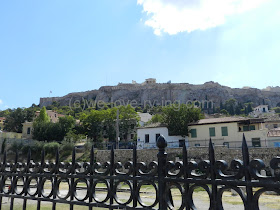The Acropolis has several buildings atop the hill but there are ruins on the hillside that we wander through as we make our way back down. The path we follow, parts of which were more like a goat path, leads us down to the Theater of Dionysos, the most important building on the southern slope.
There were rows of seating built for the crowds but special chairs lined up on the lower level that were elaborate with the middle one reserved for the priest of Dionysos, the god to whom the theater was dedicated. It is weather-worn but still a sight to see.
We stopped for lunch after leaving the ruins, with a view of the Acropolis right above us. As we made our way to the shopping area, we saw several gypsy families with young children who were performing. This young boy was pretty good considering his age and was earning himself and his family some money.
We walked to the nearby Plaka, a tourist oriented part of Athens
The Roman Agora was a community of houses, workshops and churches and was still being used until the nineteenth century when a fire in 1884 destroyed most of it. The fire offered the opportunity to excavate in the Roman Market and Hadrian’s Library and the excavation has been continuous ever since.
The rectangular building was 111x98m (364x321 ft) in size opening to a courtyard surrounded by an ionic (style of architectural design) portico (porch) which had two propyla (gateways). One of the propylon known as the Gate of Athena Archegetis, was donated by Julius Caesar and Augusta and dedicated in 11/10 BC. Both propylon were made of marble from quarries near Athens, known for their beauty and quality, many marble columns are still standing today.
Several different architectural pieces are still here and can be walked among and admired. It is protected from intruders by high fences but open for the public’s enjoyment when you purchase a ticket at the gate. It is amazing to still see their drainage system from that time and it doesn’t look too different from many we have these days.
We are standing among the ruins of the Roman Agora, which covers about a square city block, looking up to the Acropolis which sits above the city with modern homes and buildings filling the space between us. I wonder what locals think when they look out their kitchen window every day to see these ruins.
The large entrance to the museum has several areas of glass flooring so one can see below where the conservation and restoration is being done to some of the ruins at the base of the Acropolis. This area shown in the photo is open and has been walled with glass that allows us a view of what will one day be available for us to walk among and learn more of how they once lived in this neighborhood.
 |
| Acropolis Museum in Athens, Greece |
Our time in Athens was brief but we had seen what we had come to see. For more of our time in Athens, click here and here.
We were now ready to move onto the island of Santorini to spend some time being part of the local scene there and relaxing. Stay tuned and I will soon share some Santorini sights, too.







